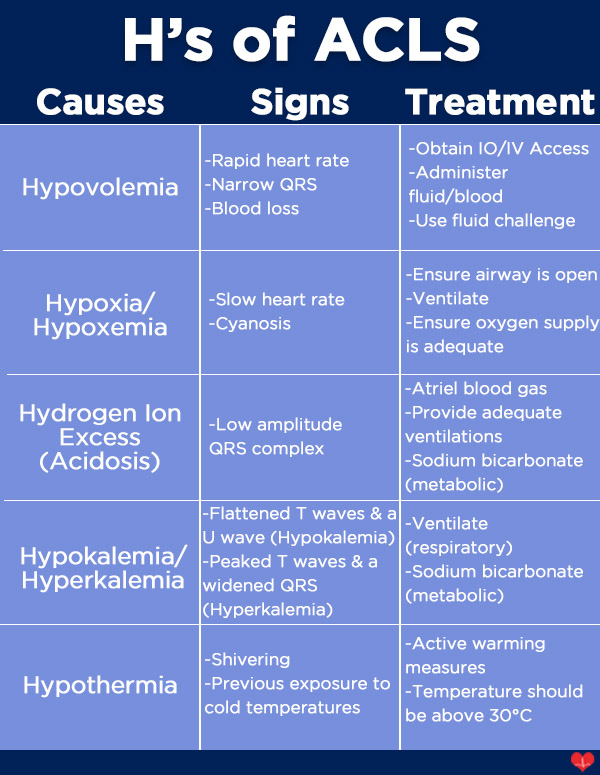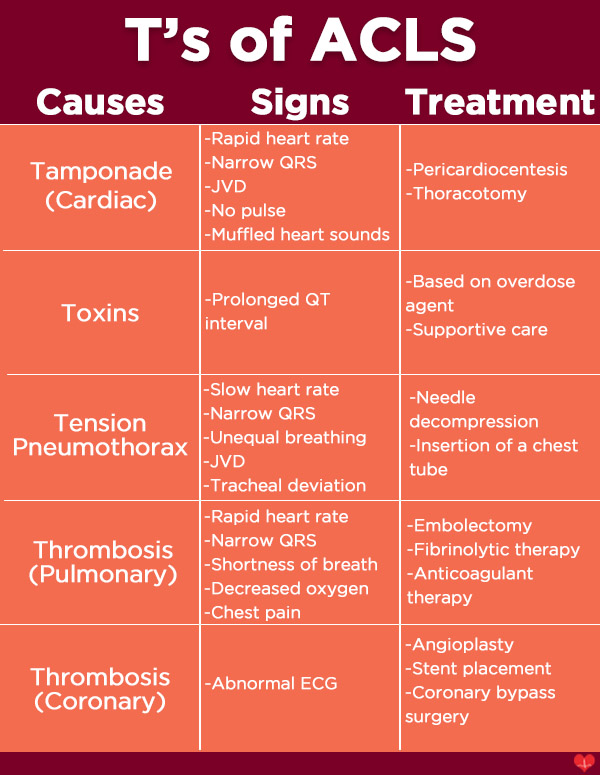How to Memorize the H’s and T’s of ACLS
How to Memorize the H’s and T’s of ACLS

by Greta Kviklyte
Life Saver, AMC
Co-authored by Kim Murray, RN, M.S.
posted on Aug 12, 2016, at 9:39 pm
SUDDEN CARDIAC ARREST, or SCA, is defined as “a sudden and unexpected pulseless condition attributed to cessation of cardiac mechanical activity”, according to the Sudden Cardiac Arrest Foundation. SCA is the leading cause of death in adults over the age of 40 in the United States, but fortunately is often reversible and can be treated with early intervention.
Understanding what protocols and actions to take when a patient is experiencing cardiac arrest is a crucial part of Advanced Cardiac Life Support (ACLS).
We offer Online ACLS Certification and Renewal
They are complex, so practitioners and teachers have developed a mnemonic device, known as the “H’s and T’s of ACLS”, which explain the conditions associated with pre-arrest and cardiac arrest algorithms.
Because many cardiac arrest conditions are reversible, determining and treating the cause is a must for optimal patient care and outcome. Here are the H’s and T’s of ACLS from the latest American Heart Association standards and guidelines and AMC.
What are the "H's"?
Hypovolemia
Hypovolemia is a common cause of cardiac arrest and develops from severe fluid or blood loss. This is typically a result of excessive sweating, vomiting, traumatic blood loss, severe burns or diarrhea.
Hypoxia or Hypoxemia
Hypoxia is an insufficiency in the amount of oxygen that reaches vital organs and tissues. It can occur from several reasons, including disorders of the lungs, drowning, fires, high altitudes, chemical or gas poisonings, etc.
Hydrogen Ion Excess (or Acidosis)
Hydrogen Ion Excess, or Acidosis, is either a respiratory or metabolic emergency that can lead to cardiac arrest that occurs when there are inadequate pH levels caused by too much acid in the body. Some causes of acidosis include lung disease, C02 buildup, DKA/AKA, liver failure, cancer, etc.
Hypokalemia and Hyperkalemia
Both hypokalemia and hyperkalemia are conditions in which potassium levels are too high or low to maintain normal contraction of the myocardium. When these levels of K+ are off, the individual is at high risk for cardiac arrest. A few causes of hypokalemia and hyperkalemia include use of diuretics, excessive vomiting, DKA, and kidney disease or failure. Hyperkalemia may be caused by diabetes, kidney disease or as a side effect of certain drugs.
Hypothermia
Hypothermia occurs when the body cannot keep itself warm and the core temperature drops below 30 degrees Celsius. Hypothermia can lead to cardiac arrest because cardiac output is decreased. Hypothermia ensues when an individual is exposed to extreme and/or extended exposure to cold weather or water temperatures.

What are the "T's"?
Tamponade (Cardiac)
Cardiac tamponade is a buildup of blood or fluid in the pericardial space, causing pressure on the heart, preventing ventricles from filling properly. Causes of tamponade include chest trauma, pericarditis and myocardial rupture.
Toxins
The ingestion of toxins is one of the most common causes of cardiac arrest, and occurs when an individual either intentionally or unintentionally overdoses on some type of medication, street drug or chemical exposure. One commonly seen sign of cardiac arrest due to toxins is a prolonged QT interval.
Tension Pneumothorax
Tension pneumothorax develops when there is a buildup of air in the pleural cavity, but there is no place for air to exit. The buildup of air causes a shift in mediastinum and venous return to the heart is blocked and can result in cardiac arrest. Some common causes of tension pneumothorax are chest trauma, iatrogenic and mechanical ventilation. Signs include unequal breathing sounds, JVD, ventilation issues and tracheal deviation.
Thrombosis (Pulmonary)
Thrombosis, or a pulmonary embolism, typically develops after a blood clot in another area of the body, and can lead to cardiac arrest in some instances. A pulmonary embolism is a blockage of the lung’s main artery, and is caused by blood clots.
Thrombosis (Coronary)
Coronary thrombosis is a blockage within the coronary artery or arteries due to clotted blood in the vessel. This prevents blood from properly flowing to the heart, and can cause cardiac arrest depending on the intensity and location of the blockage. Coronary thrombosis is caused by blood clots and myocardial infarction.

Additional resources to help you achieve ACLS success:
We offer online ACLS certification and ACLS renewal, click here to learn more!



